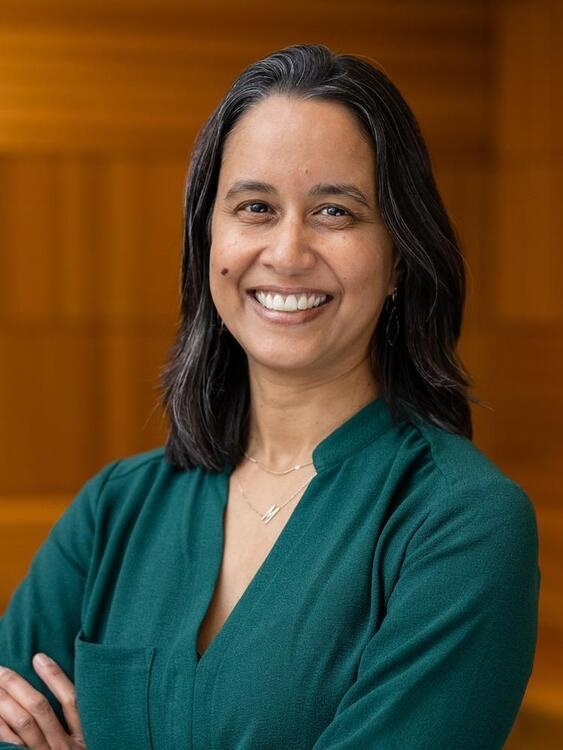
2025 Phillip A. Sharp Lecture in Neural Circuits with Mala Murthy
Description
The Phillip A. Sharp Lecture in Neural Circuits is an annual lecture in honor of Phillip Sharp, who served as founding director of McGovern Institute from 2000-2004.
Talk Title: Circuit Mechanisms for Dynamic Social Interactions
Abstract: Our research explores the neural mechanisms underlying flexibility during natural social interactions - how animals process dynamic sensory cues from a partner, make decisions, and pattern the appropriate action for the current context. During Drosophila social interactions, males produce time-varying songs via wing vibration, while females arbitrate mating decisions. We discovered that male song structure and intensity are continually sculpted by the movements of the female, over timescales ranging from tens of milliseconds to minutes, and we have investigated the underlying circuit mechanisms, from visual processing to the sequencing of actions. My lab has also investigated how song representations in the female brain drive changes in her behavior, again across multiple timescales. To uncover these mechanisms, we have developed new methods for quantification and computational modeling of behavior, as well as for brain-wide neural recording, and we combine these with the genetic and neural circuit tools of the Drosophila model system. We also recently generated the first whole-brain connectome for Drosophila, and I will discuss how we are leveraging this resource, to connect circuit architecture and activity at brain scale to behavior.
Bio: Mala Murthy (b. 1975) is an American neuroscientist and Professor of Neuroscience at Princeton University and leads the Murthy lab in the Princeton Neuroscience Institute – their work focuses on the neural mechanisms that underlie social communication, using the fruit fly Drosophila as a model system. In July 2022, she was named Director of the Princeton Neuroscience Institute.
Prof. Murthy grew up in southeast Texas and received her B.S. in Biology from MIT. She was a Burchards scholar in the humanities and won the John L. Asinari prize for outstanding undergraduate research in the life sciences. She then received her PhD in Neuroscience from Stanford University, working with Thomas Schwarz and Richard Scheller - her thesis research centered on mechanisms of vesicle trafficking to synaptic and other cell membranes. She did postdoctoral work in systems neuroscience with Gilles Laurent at Caltech, as a Helen Hay Whitney fellow. Her postdoctoral work initiated a new area of investigation into stereotypy in the central brain of Drosophila, in a region of the brain important for learning in memory. In 2010, she joined the faculty at Princeton University in the Departments of Molecular Biology and Neuroscience. She was promoted to Associate Professor in 2016 and to Full Professor in 2019.
Her research group consists of computational neuroscientists and experimentalists, who collectively study the many neural processes that underlie social communication and behavioral flexibility, including detection and recognition of multisensory cues, decision-making, execution and patterning of motor actions, and internal brain states. She co-led the FlyWire Consortium, an open science effort, that generated the first whole brain connectome for Drosophila. Her work has led to the discovery that sensory feedback cues and brain internal states dynamically modulate song patterning in flies, which has opened up the study of how the brain mediates the back and forth exchange of information between individuals, leveraging the tools of the fly model system. Her team has also developed new methods for quantifying animal behavior that have been widely used in neuroscience research.
Prof. Murthy has received a number of honors, including an NSF CAREER award, an NIH New Innovator award, an Alfred P. Sloan fellowship, a Klingenstein fellowship, a McKnight Scholar award, an NINDS Research Program award, several awards through the NIH BRAIN Initiative, an HHMI Faculty Scholar award, and a Simons Foundation Investigator award. She has participated in several events for the BRAIN Initiative at the White House and US Capitol. In 2021, she joined the Multi-Council Working Group that oversees the long-term scientific vision of the BRAIN Initiative.

